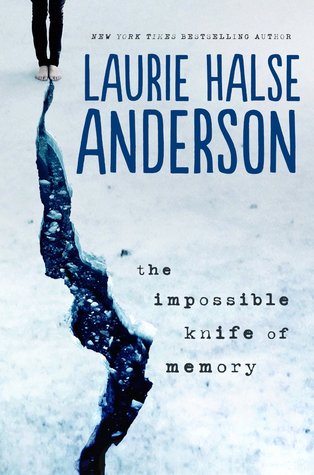Review:
Title: The Impossible Knife of Memory
Author: Laurie Halse Anderson
Publication: January 7th, 2014 by Viking Books for Young Readers
Literary Awards: National Book Award Nominee for Young People’s Literature (2014), Milwaukee County Teen Book Award Nominee (2015)
Format: Hardcover
Source: Independent Bookstore
Genre: YA; Contemporary
Blurb:
For the past five years, Hayley Kincain and her father, Andy, have been on the road, never staying long in one place as he struggles to escape the demons that have tortured him since his return from Iraq. Now they are back in the town where he grew up so Hayley can attend school. Perhaps, for the first time, Hayley can have a normal life, put aside her own painful memories, even have a relationship with Finn, the hot guy who obviously likes her but is hiding secrets of his own.
Will being back home help Andy’s PTSD, or will his terrible memories drag him to the edge of hell, and drugs push him over?
My Thoughts:
I picked this book up at a local independent book store last year right around its release date. I was drawn in by the cover, the media blitz it had received in the blogging world, and of course, Anderson’s name. (For those not familiar with the YA genre, Anderson’s book Speak is an award winning YA classic. I have previously reviewed one of her other YA novels Wintergirls).
But, the book sat on my shelf until in late 2014, when I decided that I was going to tackle my frighteningly large TBR stacks of books I already own.
In the beginning of this book, our protagonist Hayley sets the scene in a startlingly different style than Anderson’s other books. The mental stress focus of the book was not the stress of the protagonist, but instead her father. This of course, was explained in the blurb, but it still was rattling. As the opening continued, Hayley came across as a stereotypical bitter teenager. I was a little shocked.
Anderson is renowned for writing realistic, brutally realistic, real life characters. However, Hayley was nothing more than a stereotype. Every action she did, every word she said, even the story that played out on the pages was predictable and boring.
Boring to the point where the book doesn’t really have a set plot. We meander with Hayley for a while as she tackles “normal school” and relationships (which she has about one of, by the way). Anderson’s characters are typically sheltered and ostracized but not quite to the social extent as Hayley.
And as annoying as the lack of plot was, because it was annoying, Hayley’s bad attitude about everything was even more frustrating. Nothing in the world was good, no one in the world was up to her standards, everything was bad. Hayley negatively narrates her school life, with her father’s PTSD struggles no-so-subtley popping up every once in a while.
Occasionally there were also these breaks in POV, where Hayley’s father struggles to communicate his trauma in awkwardly placed prose. These moments were disappointing, because they could have been places to really show growth in Hayley’s father as a character, but instead they only seemed to (poorly) up the dramatics of the book.
Overall, the climax of the story flopped. The falling action was rushed and the ending felt like an ABC family movie. If you’re not familiar with ABC family movies, just know that they always are really bad and have cliché, overused endings.
Final Thoughts:
The Impossible Knife of Memory does not at all stand its own beside Anderson’s other work. Readers hoping for a bitter story about family issues and mental health shouldn’t even pick this up because it’s basically pages upon pages of Mary Sueish teenaged angst. However, readers who are not fans of Anderson’s extremely dark books could possible enjoy this one more, because it is no where near as serious as her previous novels.
This was certainly not my favorite of Anderson’s works. I think that if more time had been spent developing an interesting plot and character growth this book would have had a chance with Anderson’s fans, despite its different set up. Putting this books misgivings aside, Anderson’s gift of prose shines through often, and attention to details such as texting add a modern flair to this average novel.



Sorry this one fell flat for you. Of Anderson’s books, I have only read Speak, which I didn’t particularly enjoy. Not to say it was a good book, and has very important subject matter, but the narrative voice just rankled me and gave me a bit of a headache. For this reason, I’ve been hesitant to pick up her other books, and it looks like I’ll be avoiding this one too.